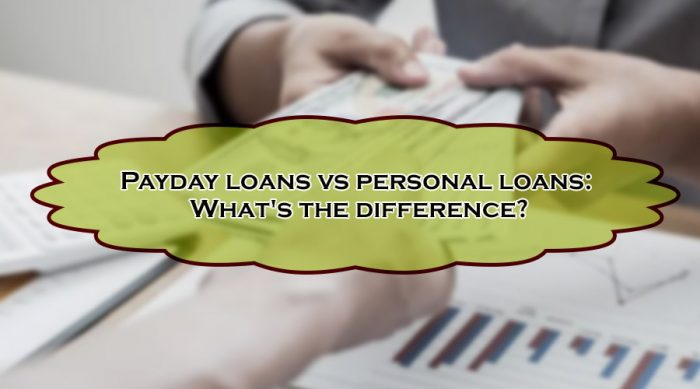There are various ways to borrow money if you need it to address an emergency. A payday loan is one. Although it’s simple to apply for, this loan can be risky. Payday loans may contain hidden fees in addition to exorbitant interest rates. Even if you initially only borrowed a tiny amount, it is pretty simple to fall into a debt trap where it is incredibly challenging to repay the loan.
A personal loan is an additional choice. Although applying for these loans is a little more complex, the interest rates are substantially lower than those of payday loans.
Personal loans are, therefore, a much safer way to get credit and are frequently used to consolidate debt.
Amounts you may borrow
While most lenders for personal loans have borrowing limits of $1,000 to $50,000, others offer greater ones of $100,000. In contrast, payday loans are often from a $100 loan option to a $500 maximum.
Payment conditions
Lenders who offer payday loans anticipate repayment from borrowers within the next pay period, often after 24 days. The lender will immediately increase interest rates if you miss the due date, resulting in default.
On the other hand, personal loans allow you to make smaller weekly or monthly payments until the debt is repaid. This plan makes managing the loan with a sensible spending plan more straightforward. Up to 24 months or even five years may be allowed for repayment periods.
Interest rates
According to data from the Federal Reserve, the average interest rate for a 24-month personal loan was 9.41 percent in the first quarter of 2022. You can utilize personal loans to combine several high-interest credit card balances into a single, lower monthly payment because their interest rates are frequently lower than those of credit cards.
For every $100 you borrow, payday loans typically charge a percentage or fixed sum.
According to the CFPB, this fee, often approximately $15, effectively equates to an annual rate (APR) of close to 400 percent for a two-week loan.
Eligibility
Personal loan eligibility requirements are extensive. Your credit score, income, and credit history are all checked by lenders when you apply through an instant loan app. Payday loans offer greater flexibility. Payday loan applicants with fair to bad credit histories are also eligible.
Anyone with identity, banking information, and a pay stub is eligible for a payday loan.
Are Payday Loans Good for Your Credit?
They most likely won’t. Payday loans usually don’t affect your credit scores because they aren’t reported to the three major national credit reporting agencies unless you default on the loan and are referred to a collection agency, damaging your credit.
Application
Banks, credit unions, and online lenders flooded the personal loan market. Some companies allow you to prequalify online, so you can check your rates without affecting your credit score.
Additionally, you can shop around and compare offers using this prequalification option.
If you choose one, you will submit a complete application and usually supporting materials such as pay stubs. At that time, the lender will also verify your credit.
You would apply to a payday lender to obtain a payday loan. Although it is unlikely that the lender will do so, it may request details about your bank account.
Unsecured or secured
Most payday loans are unsecured. Before you may acquire the loan, the lender won’t ask you for any collateral. They are heavily dependent on your paycheck, as I already mentioned.
Personal loans, however, come in two varieties: secured and unsecured. If the borrower has a low credit score, they would usually be secured. However, if you have good credit, you may be able to obtain an unsecured personal loan.
Does a Personal Loan Outperform a Payday Loan?
A personal loan will typically be less expensive than a payday loan. Most credit unions provide personal loans with APRs comparable to credit cards, which charge lower rates than payday loans. Lower-cost personal loans give borrowers more time to repay a loan than payday loans.
What occurs if a payday loan is not repaid?
On the due day, payday lenders automatically deduct the amount owing from your bank account. However, the payday lender still has a legal basis to recover their debt, even if the check bounces if your account is insufficient. The lender has the right to send your debt to collections, notify the credit bureaus of your late payments, and even file a lawsuit against you for the debt.
Which should you choose: Personal loans or payday loans?
Payday and personal loans are specifically designed to support you in various circumstances throughout your life. They are short-term loans that can be used if you require a small sum to cover an immediate demand in the middle of the month, such as a mortgage, a car repair, etc.
If you have a reliable source of income and can repay the loan within a month or on the day of your next paycheck, you can get accepted for this type of loan quickly without having to worry about having excellent credit. Therefore, consider daily unforeseen modest expenses that you can promptly pay off.
On the other hand, you can use a personal loan if you require a sizable sum of money for any purpose, including purchasing a car or jewelry, a trip, purchasing electronic equipment, wedding preparation, etc.
You must show evidence of your employment and income to be approved for a low-interest personal loan and agree to repay the loan over an extended period.
You are forced to pay a set amount of money regularly for the specified duration.
Therefore, you should consider getting a personal loan to cover more significant costs associated with life events, milestones, festivals, celebrations, and crises.

